Autodesk VRED Pro 2024.1 with Assets Win x64
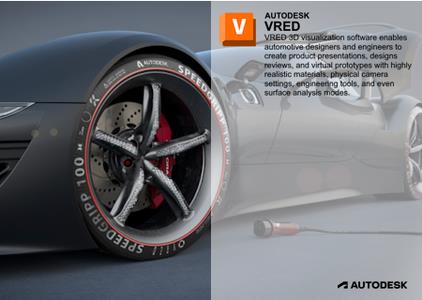
Free Download Autodesk VRED Pro 2024.1 with Assets | 10.3 Gb
Owner:Autodesk
Product Name:VRED
Version:2024.1 Professional with Assets
Supported Architectures:x64
Website Home Page :www.autodesk.com
Languages Supported:english
System Requirements:Windows *
Size:11.3 Gb
Autodesk Inc. is pleased to announce the availability ofVRED Products 2024.1is an visualization software enables automotive designers and engineers to create product presentations, design reviews, and virtual prototypes with highly realistic materials, physical camera settings, engineering tools, and even surface analysis modes.
VRED 2024.1 Release Notes
Requirement for VRED 2024.1
The following is required for VRED 2024.1:
-For Windows users, 2024.1 requiresan NVIDIA RTX driver v.516.10 or above.
- For Linux users, 2024.1 requires an NVIDIA driver v.515.43.04 or above.
- Linux dependency for Render Node - If working on a Linux machine, set your local directory to /var/opt/Autodesk with write access on the Linux machine that is running the VRED 2024.1 Render Node.
This first point release continues its focus on creating a great customer experience. Much has been added to this VRED 2024.1 to increase your flexibility, customization and visual quality.
Among the enhancements to this release are:
- Custom image files as thumbnails for varient sets
- Ability to pin frequently used functions to the quick access bar
- Ability to turn on or off tooltips
- Progress bar for downloads
- Improvements to menu bar on several editors
- New file formats supported for additive files as well as building or infrastructure files
- Addition of the Vive Tracker extention for your VR experience
The video below goes into these updates and more, in detail:
Bake Light and Shadows Module
- Custom - Options in the Advanced tab display the correct content and no longer display Custom.
Cameras
- Name Update - Camera names are now updated for undocked render windows.
- Moving Cameras - Cameras can once again be dragged and dropped out of groups and into the top-level hierarchy in the Camera Editor.
- Option Placement - Corrected the placement of the Add Node, Remove Node, and Build Scene options in the Advanced tab of the Camera Editor.
- Collapse/Expand - Double-clicking a group or camera track expands or collapses its node structure.
Clusters
- Systemd Init - Created an example for RedHat8 of the Cluster Service startup script for the systemd initialization mechanism on Linux. The template is installed here: bin/clusterService.service.
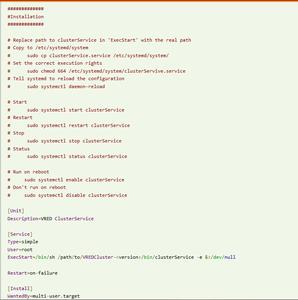
CPU Raytracing
- Parallax Mapping - Applying a rotation or texture transformation in the UV Texture mode, then switching to Triplanar, no longer results in an incorrect parallax mapping for Substance materials.
File Import and Export
- Web Engine - Exporting a scene with a web engine, using Export Selected, no longer results in a crash.
- Light Link Sets - Light Link Sets are no longer lost when exporting a scene with specific export settings to VPB.
- importedFile - Deprecated and removed the importedFile signal from vrFileIOService.
- FBX - Loading an FBX file with mismatched vertices and texture coordinates no longer causes a crash.
- Camera Duplication - Using Export Selected no longer results in an exported file containing a duplicate of the default cameras.
General
- Slider Cropped - When using a monitor with 200% scaling, the infinite slider is no longer cropped.
- Spelling - Corrected the spelling in the Tessellation preferences.
- Tooltip - Corrected the Version and Format tooltips in Edit > Preferences > FileIO > FBX > Export tab > File Specific Options.
- Toolclips - We added missing toolclips to various editors.
- Locked Nodes - Made it easier to identify locked nodes in all editors, as the node name is now greyed out.
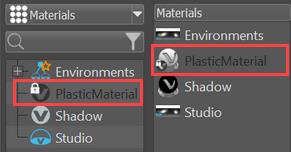
- Window Size - A maximized VRED window retains its size when the splitter handle is dragged between docked modules.
- Warning Message - A warning message appears when an H264 codec is needed, but not installed.
- Onboarding - Only the selected option is highlighted in the onboarding table of contents.
- Color Tooltip - Corrected the tooltip for the Color Collaboration preference.
- Save Workspace - The warning dialog indicating a custom workspace has not been saved, now appears whenever a custom workspace is created.
- Tracking - ADP is once again tracking the opening and closing of modules, as well as the actions of the Create Material menu.
- Spectrum Tab - The Spectrum tab is no longer missing from the Color Picker dialog.
- Color Picker - The Color Picker dialog now closes once a selected material is changed or the Material Editor is closed.
- The Color Picker dialog is once again resizeable.
- Pipette - The Color Picker pipette can now select colors from external images.
GPU and GPU Raytracing
- Back-facing Surfaces - Removed subsurface scattering from back-facing surfaces.
- Carbon Carbon - Corrected the triplanar mapped carbon pattern rotation for the Carbon material.
- Rays - Normal differentials are now calculated correctly, fixing the issue of blurred reflections, when a ray hits a surface on the backside.
- Attenuation - When using the Attenuation Mode, Linear in, and rendering a scene, the results are the same for GPU and CPU raytracing. The GPU raytracing rendering is no longer brighter.
- Shadow Material - MDL glass or a glass with Use Density enabled, now show the correct result when in front of a shadow material.
- Self-intersection - Implemented the new NVIDIA library to help avoid self-intersection issues when GPU raytracing.
Grouped Modules
- Resizing - When two, non-grouped modules are grouped together, these grouped modules can now be resized to be smaller than that of the individual modules.
. Grouped modules no longer get unexpectedly resized down to a very small width.
Import
- Merge Materials - The Merge Materials state is now considered when importing the following:
. VPB files created by File > Save Selected where the Include Environment Geometries option is disabled.
. OSB files created by one of the File > Export functions where the Include Environment Geometries is enabled.
- Re-tessellation - Fixed the Parasolid re-tessellated surfaces issue, so surfaces are now re-tessellated as expected.
- .wire Files - For VRED 2020.3 and newer versions, you can now import Alias .wire files with paths contains multi-byte characters, like those used for Japanese, Korean, and Chinese content.
- Tags - Importing data with scene tags that have the same string, but different upper and lowercase letters, such as Tag, TAg, TaG, TAG, are now correctly handled and don't results in a crash.
Light Editor
- Color Themes - Switching between color themes, especially between dark and light ones, no longer causes issues in Light Editor.
Materials
- Tire - When displacement is enabled for a tire material, the tire walls are now visible.
- EDF - EDF MDL materials appear in a glossy reflection with GPU raytracing, when used as a light source.
- Incorrect Transforms - Corrected the transform matrices in OpenGL that were passed to MDL and MaterialX materials.
- IES Profile - Using more than one MDL material as a light source no longer results in artifacts.
- Handle - Removed an unnecessary splitter handle from the MDL and MaterialX material attributes.
- Merge Duplicate Materials will be able to merge duplicate materials that are in switch materials. It allows sub-materials from switch materials or multipass materials to be merged. Locked materials are replaced during the merge by matching duplicates but their entries in the Material Editor will be not deleted.
. Ignore Names might replace the child materials of switches with duplicates that have a different name.

. Include Switch Materials - When checked, switch materials are merged, if they are duplicated. This has no effect on the merge of children within switches.
. Include X-Rite Materials - When checked, X-Rite materials are merged, if they are duplicated.
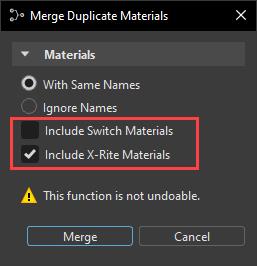
Metadata Editor
- The options in the Selection menu work as expected.
Node Editor
- Header Styles - Fixed the header style in the Node Editor.
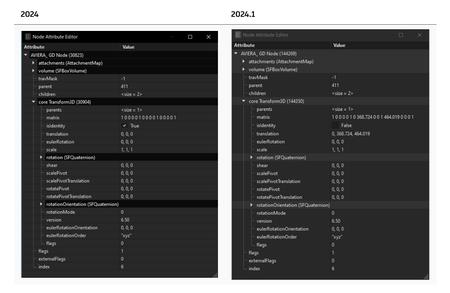
OpenGL and Rendering
- Area Light Shadows - Fixed the area light shadow differences that once appeared with OpenGL.
OpenXR
- Hand Pose Only - Interactions, such as the teleport and pointer, are now disabled when in the Hand Pose Only mode.
- Buttons - Mixed reality tools are no longer displayed in the VR Menu after switching from Varjo HMD to OpenXR mode.
- Hands - Tracked hands in OpenXR are no longer stretched, but are the same as those in Varjo HMD mode.
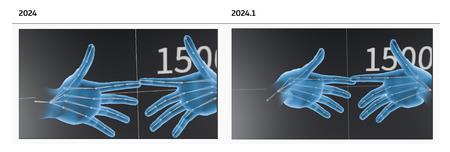
Scenegraph
- Clone Nodes - Transformable clone nodes are properly pasted "As Clones" on multi-selection.
Sceneplate Editor
- Expand/Collapse - Double-clicking a group or switch expands or collapses its node structure.
Scripting
- vrPySideExample - Fixed examples/plugins/vrPySideExample.py.
Streaming App
- Port Updating - The WebInterface port updates at runtime when changed in the preferences.
Transform Module
- Lock/Unlock - Removed Lock/Unlock from the Transform module.
- Metadata - Corrected the jumping behavior when selecting a metadata entry.
- Spacing - Unified the spacing between Transform Editor controls with that of other modules.
UI Fixes
- Button Layout - Fixed the order and layout of the Transform Position buttons in the Light Editor.
- Tooltip Time - Made the response time consistent for tooltips, when hovering over an icon.
- Search Bar - Fixed the alignment of the advanced search Search bar.
- Button Alignment - Fixed the alignment of buttons in the Metadata Editor.
- Window Resizing - Grouped modules retain their size, even after VRED is minimized, then restored to size.
- Adjacency - Capped the maximum size of the Adjacency dialog when resized.
- Close Button - Fixed the layout of the onboarding Close button.
- UI Errors - Corrected spelling, spacing, and tooltip errors in the Optimize module and other modules to improve readability.
- UI Alignment - Fixed the alignment of controls in the Virtual Reality and Transform preferences.
- UI Element - Fixed the minimum size of the PBAR, VRPN, and RenderQueue modules, so UI elements are not cut off when scaled down.
- Capitalization - Corrected capitalization issues in modules, filter menus, and dialogs.
- Splitter Cursor - Fixed the issue with the splitter cursor when working with multiple render windows.
- Automotive Assets - Unneeded UI elements are now removed or greyed out.
- Localized Buttons - Continue and Cancel are now localized in the unsaved Workspace dialog.
- Localized Strings - Fixed the localization for the "Failed to access windows service manager..." strings.
- Light Theme - Corrected a minor UI defect in the Script preferences of the Light color theme.
- Corrected the Light theme background color when using a fixed render window resolution.
- Enable - Removed the Enable button, when the spectrum is not available, from the Color Picker dialog.
- Readability - Fixed the format of copied and pasted text in the Terminal to make it readable.
- UV Editor - Restored the horizontal layout of the Place Texture 3D and 2D widgets in the UV Editor.
- Underlining - Removed the unnecessary underlining of letter in the Geometry Editor.
- Checkboxes - Fixed the visibility of the Preferences > References > Revision Monitoring checkboxes.
- Floating Windows - Modules that are opened at the same time in the Default or Custom workspace are now floating, and not grouped in error.
- Undoing Changes - After changing an option's value in a spinner field, while in edit mode by pressing Enter, values changes can now be undone.
Variant Sets
- Renaming - Groups and Variant Sets can be renamed in both display modes.
- Default Highlight - Re-implemented the default blue highlight state.
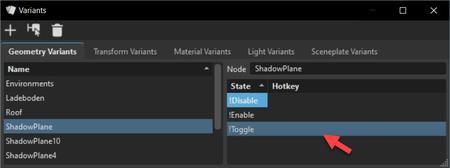
- Add Icon - The initial Add variant set icon is displayed correctly in the Simple View Mode.
- Background - The collapsible frame background of variant groups in the Simple View Mode is displayed.
- Updated Thumbnails - After switching from the Variant Sets Thumbnail view to the normal view, importing variant sets, and switching the view again, the imported variant set thumbnail is displayed.
Visualization
- Checked State - When switching from Non Photorealistic Rendering to Raytracing, the Visualization menu shows that Realistic Rendering is active.
VR and XR
- Tool Name - Fixed the tool name of the Place tool, so it can now be read.
- Varjo XR-3 - Raytracing now works with the Varjo XR-3, so the scene is no longer rendered a grainy grey, blue, or noisy black.
- vrDeviceService.deactivateInteraction('Tools Menu') - Deactivating interactions using vrDeviceService.deactivateInteraction('Tools Menu') disables both hand and controllers for all modes: OpenXR, OpenVR, and Varjo.
- vrDeviceService.deactivateInteraction - Fixed the script, vrDeviceService.deactivateInteraction, so it now disables VR controller functions.
VRED Go
- Fixed the menu option, Options. Now, you can access the View Cube Options dialog in VRED Go to change the position, size, and opacity of the View Cube.
Known Issues and Workarounds
- Cluster Manager - When saving renders from the Cluster Manager job queue to a network folder, VRED fails to create an output file or trigger a warning.
- A workaround for this is to change the file name, the path in Render Settings, and then check to see if the image already exists in that location.
- Cluster Failure - A cluster will fail to start, if the last node is localhost in the cluster list.
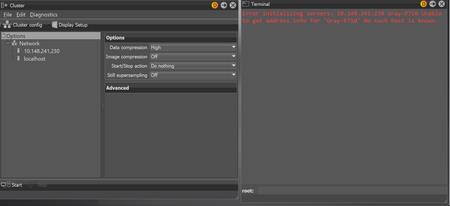
Explanation:A pipeline and PCs at the beginning of the list need to reach PCs later in the list by the given Name or IP Address. If localhost is used, VRED tries to use the hostname of the master PC; however, PC 10.148.241.230 doesn't know GRED-P710 by name.
- Internet Explorer dependency - If installing VRED 2020 on a machine running Internet Explorer, Internet Explorer 10 is needed to display the Let's get started screen.
A workaround for this is to create a deployment installer. When creating deployment installer images, VRED starts up fine for all license types. In the VRED user control popup menu,
. Sign In works
. Sign Out And Quit (user license) won't work
. Manage License won't work
. Explore Purchase Options sort of works, but the web page looks strange due to the older version of Internet Explorer
Autodesk VRED (that's Virtual Reality Editor)covers advanced visualisation, rendering and design review. VRED is a visualisation system, but it's one that combines the progressive, physically based rendering available in other systems (such as KeyShot or V-Ray) with a set of tools to allow you to bake those visualisation properties (materials, textures, lightings, shadows and so on) into highly efficient datasets that support design review, collaboration, large-scale visualisation and increasingly, virtual reality.
VRED Professionalis an innovative and powerful software solutionfor 3D visualization with a superior quality. Fitted with physical camera and material and light settings, based on plastic, metal, coal or fabric physical features, VRED Professional allows users to create visual phototrrealistic fixes. The higher quality that you can achieve straight from VRED Professional, reduces significantly post-production costs. Use theAsset Managerin VRED to manage items like scenes, environments, and materials across multiple projects. Each tab contains the assets and location of those assets for that category. Global assets stored anywhere in the network can be accessed as from a local folder. This supports standardization throughout several projects or even across multiple departments within the company.
VRED 2024 What's New
With VRED 2024 we have reworked and modernized the User Experience and implemented MDL and MaterialX which will give you a ton of more options when working with Materials.
Autodeskhelps people imagine, design and create a better world. Everyone-from design professionals, engineers and architects to digital artists, students and hobbyists-uses Autodesk software to unlock their creativity and solve important challenges.

Buy Premium From My Links To Get Resumable Support,Max Speed & Support Me
Rapidgator-->Click Link PeepLink Below Here Contains Rapidgator
http://peeplink.in/4b629d195b51
NitroFlare
c8m4m.SETUP.part1.rar
c8m4m.SETUP.part2.rar
c8m4m.SETUP.part3.rar
Autodesk VRED Pro 2024.1 with Assets Win x64 Torrent Download , Autodesk VRED Pro 2024.1 with Assets Win x64 Crack Download , Autodesk VRED Pro 2024.1 with Assets Win x64 Patch Download , Autodesk VRED Pro 2024.1 with Assets Win x64 Serial Keygen Download
Free Download Autodesk VRED Pro 2024.1 with Assets Win x64 is known for its high-speed downloads. It uses multiple file hosting services such as Rapidgator.net, Nitroflare.com, Uploadgig.com, and Mediafire.com to host its files